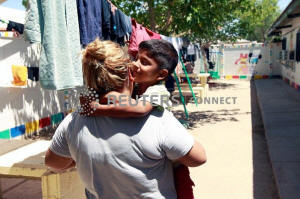Thousands of Central American migrants take free rides home courtesy of
U.S. government
 Send a link to a friend
Send a link to a friend
 [August 21, 2019]
By Mica Rosenberg, Kristina Cooke and Daniel Trotta [August 21, 2019]
By Mica Rosenberg, Kristina Cooke and Daniel Trotta
(Reuters) - More than 2,000 Central
American migrants seeking to settle in the United States have given up
and accepted free rides home under a 10-month-old program funded by the
U.S. government and run by a United Nations agency, according to a U.N.
official.
The "Assisted Voluntary Return" program has paid for buses or flights
for 2,170 migrants who either never reached the United States or were
detained after crossing the border and then sent to Mexico to await U.S.
immigration hearings, according to Christopher Gascon, an official with
the U.N.'s International Organization for Migration (IOM).
The $1.65 million program, funded by the U.S. State Department, is
raising concerns among immigration advocates who say it could violate a
principle under international law against returning asylum seekers to
countries where they could face persecution.
The returned migrants have not been interviewed by U.S. asylum officers.
But Gascon said his agency screens all participants to ensure they are
not seeking U.S. asylum and want to go back.
Gascon, head of the IOM's Mexico mission, said the program provides a
safer and more humane means of return than the migrants could arrange on
their own.

The effort , whose scope and controversial aspects have not been
previously reported, is the first by the State Department and UN to
target Central American migrants in Mexico on such a large scale. The
State Department would not comment on the record about its role.
Gascon said the State Department reached out to the IOM last year as
caravans of thousands of Central American migrants traveled through
Mexico toward the U.S. border.
U.S. President Donald Trump called the caravans an "invasion" and has
made stemming immigration a centerpiece of his administration and 2020
re-election campaign.
Migrant advocates are particularly concerned about 347 people returned
by the IOM who had been stuck in Mexico under a controversial Trump
administration policy known as the Migrant Protection Protocols (MPP).
Under that policy, which began Jan. 29, some migrants who make it across
the U.S.-Mexico border are given a notice to appear in U.S. immigration
court, then are then turned back to Mexico to wait the months it can
take for their court cases to be resolved. In the past seven months,
more than 30,000 migrants have been sent back under MPP, according to
U.S. Customs and Border Protection.
Advocates say that the migrants often face danger and destitution in
Mexican border towns, leaving them no good options.
"How can it be a voluntary decision (to return home) given the
conditions they face in Mexico? It's a choice between two hells," said
Nicolas Palazzo, an attorney with El Paso-based Las Americas Immigrant
Advocacy Center.
Besides any danger they might face back home, there is another
significant downside to leaving: If migrants do not show up for a U.S.
court hearing, they can be ordered deported "in absentia," reducing
their odds of ever being granted refuge in the United States.
AFRAID TO GO, AFRAID TO STAY
Denia Carranza, a 24-year-old Honduran returned to Mexico to await a
court hearing set for October, decided instead to board a bus back home
last week.
She said she and her 7-year-old son had fled her hometown and a good job
at a shrimp packing company after gang members threatened to kill her if
she did not deal drugs to fellow employees. She had hoped to apply for
U.S. asylum.
But she said she was frightened in Ciudad Juarez - a battleground for
drug cartels where the bulk of migrants await their hearings. Also, she
had no job and no way to provide for her son.

"I am scared of going back to Honduras. But I am more afraid to stay,"
she said.
The U.S.-based nonprofit Human Rights First said it had documented more
than 100 violent incidents perpetrated against migrants waiting in
Mexico for U.S. court hearings this year, including rape, kidnapping,
robbery, assault and police extortion.
The IOM documented 247 deaths of migrants near the US-Mexico border this
year through Aug. 15.
[to top of second column]
|

Honduran migrant Denia Carranza, 24, and her son Robert, 7, who have
given up their U.S. asylum claim under the Migrant Protection
Protocol (MPP), leave Casa del Migrante migrant shelter to board a
bus after they voluntarily asked to return to their country, in
Ciudad Juarez, Mexico August 13, 2019. REUTERS/Jose Luis Gonzalez

In a July 30 letter to the IOM's Director General, 30 U.S. and
international advocacy organizations said they feared the U.N.
organization was returning migrants to countries they had fled "out
of desperation, not choice, and where they may not fully understand
the consequences of failing to appear whenever summoned by a U.S.
immigration court."
There is no way of knowing how many of the migrants who opt to go
home with IOM help might have been able to present a successful
asylum claim. U.S. courts ultimately deny most such claims brought
by Central Americans and the Trump administration has said many are
fraudulent.
Migrants who are sent to Mexico under MPP may or may not be seeking
U.S. asylum, but they generally have no opportunity to initiate such
claims before being sent back across the border. The policy cuts out
a traditional asylum screening step in which migrants are
interviewed to establish whether they have a "credible fear" of
returning home.
SEEING 'REALITY'
When the U.S. State Department approached IOM last fall, Gascon
said, part of the goal was to counter what is saw as misinformation
about how easy it was to get into the United States.
IOM set up kiosks at a stadium in Mexico City, which was along the
caravan route, and on the U.S.-Mexico border. It also helped spread
the word about free rides back in migrant shelters.
"When they saw the reality, some decided to go home," he said of
migrants.
Three quarters of the migrants in the voluntary return program went
back to Honduras, a fifth to El Salvador and the rest to Guatemala
and Nicaragua, according to IOM figures through July 26 of this
year. More than half were "family units" and about 100 were
unaccompanied minors. Most of the migrants have been sent back from
Mexico, and a small fraction from Guatemala.
The IOM screens all migrants who ask to go home, but those awaiting
U.S. hearings in Mexico also undergo an orientation program with
Grupo Beta, an arm of Mexico's National Migration Institute, to
ensure migrants understand their options, Gascon said.

So far, Gascon said, two people awaiting U.S. court hearings in
Mexico who wanted a ride back were instead referred to the Mexican
government to gauge their eligibility for asylum in Mexico.
But advocates said they worried that Grupo Beta is not the best
partner for IOM to ensure migrants' safety.
"Many organizations have documented time and again that Mexican
migration officials don't refer people to (the national refugee
office), they don't register fears of return, and they have even
pressured people to withdraw (asylum) claims," said Kennji Kizuka, a
researcher at the nonprofit Human Rights First.
Mexican migration officials did not respond to a request for
comment.
More than a dozen migrants awaiting U.S. hearings at the Casa de
Migrante shelter in Ciudad Juarez told Reuters the weekly
south-bound bus rides held some appeal. Though reluctant to give up
on their American dreams, many didn't have lawyers and saw little
prospect for success.
"All that effort we made to get here from Honduras and now we're
going back," said Angel Estrada, who had hoped to get care in the
United States for his 9-year-old son, who has hemophilia. "It's
really sad."
(Reporting by Daniel Trotta in Ciudad Juarez, Kristina Cooke in San
Francisco and Mica Rosenberg New York; Additional reporting by Julia
Love in Ciudad Juarez, Lizbeth Diaz in Tijuana and Stephanie Nebehay
in Geneva; Editing by Julie Marquis and Brian Thevenot)
[© 2019 Thomson Reuters. All rights
reserved.]
Copyright 2019 Reuters. All rights reserved. This material may not be published,
broadcast, rewritten or redistributed.
Thompson Reuters is solely responsible for this content. |